|
Standing (from left to right): John D. Chambers,
William Black, A.W. Buchan, David Forsyth, John Macfie, John Russell,
James Marshall, J. Cappie, W.W. Robertson, W.H. Maslin, James Phillips,
A.M. Broun, Alfred D. Vardon, James Pringle. Sitting (from left to right):
George G. Gibson, George B. Fraser, Robert Brander, Daniel Y. Mills, Christopher
Meikle, George M'Arthur, Georges E. Barbier.
They
Came from Manchester and New York
The picture
above was taken on July 16, 1887, after the conclusion of the Fourth
Congress of the Scottish Chess Association in Edinburgh. This congress
commenced on July 11, 1887, and took place in the rooms of the Edinburgh
Chess Club, Philosophical Institution, 4 Queen street, Edinburgh.
The
program consisted of three competitions: a major tournament, a minor
tournament for players who did not consider themselves strong enough, or
had no time for the major tournament, and a handicap contest.
Competitors in the major tournament were excluded from the minor, but
participants in both the major and the minor fray were allowed to enter
the handicap tournament.
Each
contestant had to play one game against every other competitor, draws
counting. According to the rules, the player attaining the highest
aggregate score was the winner. In the event of equal scores, the
Playing Committee would determine whether a tie should be played of one or
more games.
Prizes
in the major tournament were: first, the Champions Cup, with a value of
£25, and £4 4s.; second £2 2s.; and third £1 1s. First prize in the
minor tournament was £3 3s., second was £1 1s. The winner of the
handicap received £3 3s. Second prize in this competition was £1 11s.
6d.
The
entrance fee: to the major tourney 10s. , to the minor 5s., and to the
handicap 2s. 6d. The time limit was 20 moves per hour. The use of sand
glasses in the first tournament was compulsory, unless both players
decided not to do so. Play commenced on the first day at 11.00 a.m.
and on subsequent days at 10.00 a.m.
The competitors were allowed to meet at an earlier hour if mutually
agreed. "It is hoped that each player will endeavour to play at least
two games per diem in the
Major and Minor Tournament," wrote the organizers in the program and
rules of the meeting. The games were played according to the rules of
the 1883 London International Tournament.1
The
liberty granted to the players in the tournament had its drawback, as
Barbier pointed out in his chess column in the Glasgow
Weekly Citizen of July 2, 1887:
We
desire to draw the attention of the gentlemen about to take part in the
Tournament to a matter of some importance. Of course, it is impossible,
or all but impossible to regulate the play in this Tournament as it is
in some Tournaments, where all the players start with no other business
on hand than that of attending to the play. Many players in Edinburgh
may not be able to play till in the hours of the afternoon or the
evening. This is a drawback which is inseparable from such meetings, but
the inconvenience resulting from it in making the number of games played
by each competitor unequal – and sometimes very unequal at certain
stages – might be minimised by all the competitors joining in making
such arrangements among themselves as shall keep the players, as the
play proceeds, fairly abreast of each other as to the number of games
played. This inconvenience – which must not be exaggerated, but which
is a real inconvenience nevertheless – may result in a position like
the following: – We will suppose there are 13 competitors, which means
12 games to play for each. A has played 11 games, winning 10, losing 1.
He has only Z to play. Z has played 9 games, winning 8, losing 1. He has
3 to play, one of them with A. At this stage the score indicate that the
first place must fall either to A or Z. Now, both Z and A are found with
"no work to do," ; as all the other competitors are engaged or
absent for the time. Here, it would clearly be sheer folly for A to
allow himself to be blandly counselled to play Z. Let Z bring up his
number of games to A's. Why should A be advised to be a means of
destroying his chance? He has played two games more than Z. Let Z play
these two games, and, for all we know, his score may get so injured that
the result of his game with A will be a matter of no consequence so far
as the first place is concerned.
The
number of players in the major competition was not thirteen as in Barbier's example, but less. Nine men signed up to compete. The
contestants were, in alphabetic order: Georges E. Barbier (from Glasgow),
John D. Chambers (Glasgow), George B. Fraser (Dundee), David M. Latta (Edinburgh),
James Marshall (Glasgow), Christopher Meikle (Edinburgh), Daniel Y.
Mills (Manchester), Walter C. Spens (Glasgow), and James Young (Glasgow).
The number of entrants was a disappointment. The first congress in 1884 –
the year that the Scottish Chess Association was founded – was
attended by ten players, and at the second congress in 1885 and third in
1886 twelve contestants were present. Barbier wrote nine days before the
commencement of the fourth meeting:2
THE
SCOTTISH CHESS ASSOCIATION TOURNAMENT.
This
important Tournament will take place this year in the rooms of the
Edinburgh Chess Club, during the week beginning 11th July, and it is
expected that the meeting will be largely attended and prove as
successful as those of preceding years. Nothing very definite is known
yet as to the probable competitors, but Glasgow is likely to be
represented by Sheriff Spens, Messrs. M'Leod, Marshall, Gilchrist,
Chambers, Fyfe, and Barbier. The interest of the meeting would be
considerably increased if Mr. Crum, who won the cup the first year it
was competed for, entered the lists, for he is a very "dour" man
over the board; but the assiduous court he was wont to pay to his old
love has dwindled for some time past into lukewarm and inconstant
attentions. It is safe to predict that Dundee will be represented by Mr.
G.B. Fraser. Messrs. Court and John Russell, of the Glasgow Central
Club, both very strong players, will not be able to attend through
business engagements, and this is to be regretted, as the result of no
Scottish Tournament can be considered absolute when these two players
are absent. Edinburgh will be represented by Dr. Rattray, if he is at
home, by Messrs. Meikle and Forsyth, and possibly also by Messrs. Latta,
Galloway, and J. Macfie. Mr. MacConnochie, the editor of the Northern
Figaro chess column, may represent Aberdeen. Mr. Mill, who won the cup
two years ago, will be one of the competitors, and should give a good
account of himself, if we take into consideration the excellent score he
made on that occasion, and the great form he has shown lately over the
board in London and elsewhere with strong players; in fact, he is looked
upon as having the best chances of the championship.
No
playing schedule was fixed for the tournament. Therefore the progress is
veiled in mist, with the exception that Barbier, Fraser, Meikle and
Mills took an early lead, and that the competition was decided on
the final day (Saturday, July 16, 1887), when Mills opposed Barbier.
Mills lost his first game in the tournament, against Meikle.3
The
following is known about the daily play:4
Monday,
July 11, 1887: Spens
– Mills 0-1; Young lost against Chambers; Latta – Barbier 0-1;
Barbier won against Meikle; Meikle won against Latta, Mills and Spens.
Tuesday,
July 12, 1887:
Spens – Young 1-0; Chambers – Mills 0-1; Mills won against Latta; Fraser won
against Barbier; Chambers – Meikle 1-0; Chambers won against Spens;
Latta won against Young; Meikle won against Fraser; Young won against
Marshall; Barbier – Marshall 1-0
Wednesday,
July 13, 1887:
Meikle – Young
1-0; Mills won against Young; Chambers
–
Latta 1-0; Fraser won against Spens; Marshall won against Meikle.
Thursday,
July 14, 1887:
Chambers drew with Barbier, Fraser won against Young, Marshall won
against Chambers.
Saturday,
July 16, 1887:
Mills – Barbier ½-½.
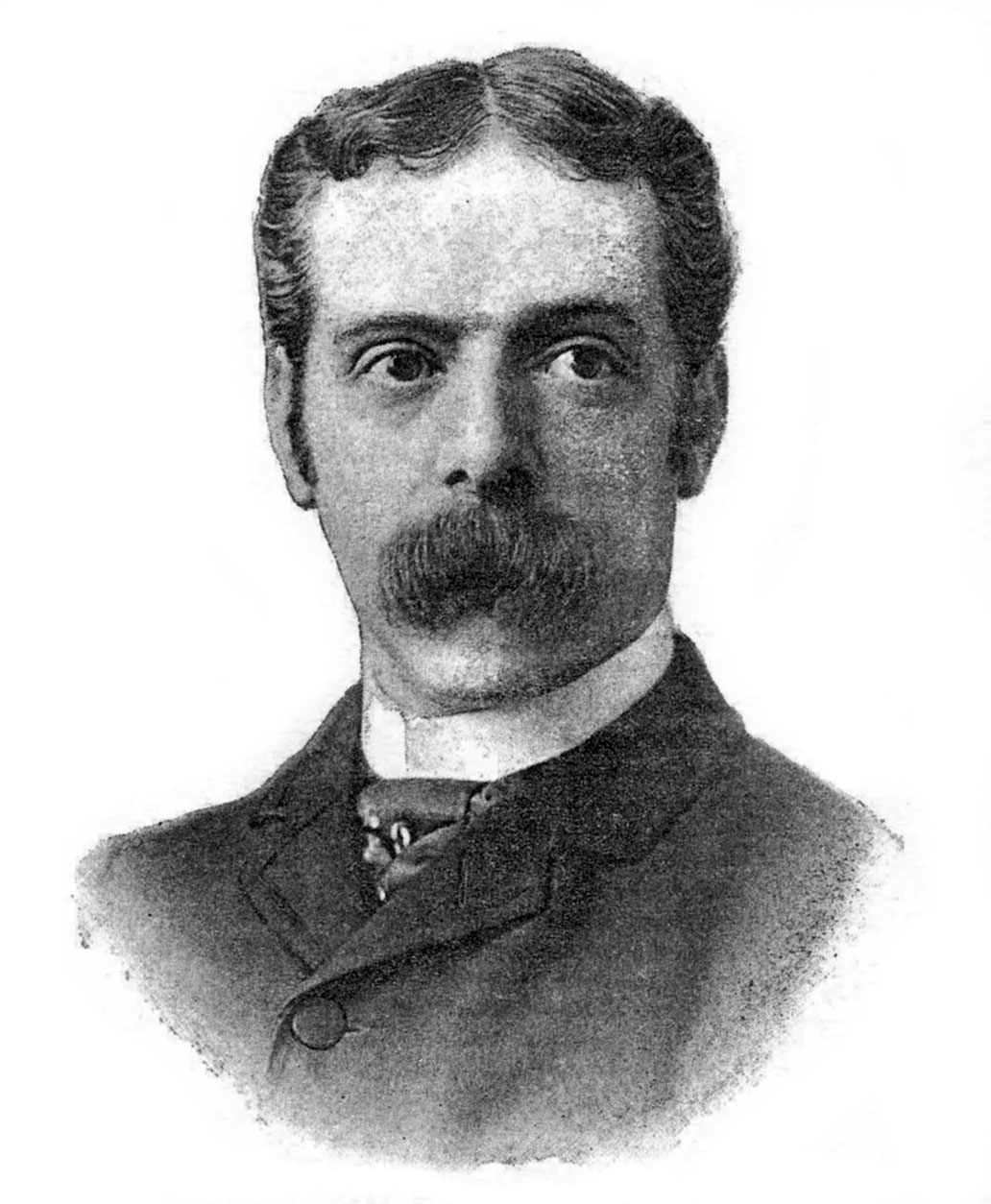 Daniel Y. Mills
Daniel Y. Mills
According
to the Glasgow Weekly Citizen
of July 16, 1887, Meikle, who was President of the Edinburgh Chess Club,
finished four games on the first day of play. Barbier claimed that he
had also contested four games on the opening day of the Third Congress
of the Scottish Chess Association, which was held in Glasgow in 1886.
Barbier won that tournament.
Immediately
after the decisive game between Mills and Barbier the above photograph was
taken.5 The results in the major competition:6
|
|
|
1
|
2
|
3
|
4
|
5
|
6
|
7
|
8
|
9
|
|
|
|
1
|
Mills
|
•
|
1
|
½
|
0
|
1
|
1
|
1
|
1
|
1
|
6
|
½
|
|
2
|
Fraser
|
0
|
•
|
1
|
0
|
1
|
1
|
1
|
1
|
1
|
6
|
|
|
3
|
Barbier
|
½
|
0
|
•
|
1
|
½
|
1
|
1
|
1
|
1
|
6
|
|
|
4
|
Meikle
|
1
|
1
|
0
|
•
|
0
|
0
|
1
|
1
|
1
|
5
|
|
|
5
|
Chambers
|
0
|
0
|
½
|
1
|
•
|
0
|
1
|
1
|
1
|
4
|
½
|
|
6
|
Marshall
|
0
|
0
|
0
|
1
|
1
|
•
|
.
|
1
|
0
|
3
|
|
|
7
|
Spens
|
0
|
0
|
0
|
0
|
0
|
.
|
•
|
1
|
1
|
2
|
|
|
8
|
Latta
|
0
|
0
|
0
|
0
|
0
|
0
|
0
|
•
|
1
|
1
|
|
|
9
|
Young
|
0
|
0
|
0
|
0
|
0
|
1
|
0
|
0
|
•
|
1
|
|
The
game between Marshall and Spens was not played.
The
players in the minor tournament were William Black (from Glasgow), Robert
Brander (Lossiemouth), A.W. Buchan (Portobello), George G. Gibson (Edinburgh),
John Macfie (Edinburgh), J. Mackenzie (Islay), W.H. Maslin (Alloa),
Charles Matthew (Edinburgh), James Phillips (Helensburgh), W.W.
Robertson (Edinburgh), George Shand (Glasgow), and Alfred D. Vardon (Edinburgh).
Black,
who was Secretary of the Glasgow Chess Club, won first prize. Macfie and
Robertson tied for the second prize. The tie game was won by Macfie. The
final table of results:7
|
|
|
1
|
2
|
3
|
4
|
5
|
6
|
7
|
8
|
9
|
10
|
11
|
12
|
|
|
|
1
|
Black
|
•
|
1
|
1
|
1
|
0
|
1
|
1
|
1
|
0
|
1
|
1
|
1
|
9
|
|
|
2
|
Macfie
|
0
|
•
|
½
|
0
|
1
|
1
|
1
|
1
|
1
|
1
|
1
|
1
|
8
|
½
|
|
3
|
Robertson
|
0
|
½
|
•
|
1
|
1
|
1
|
1
|
0
|
1
|
1
|
1
|
1
|
8
|
½
|
|
4
|
Phillips
|
0
|
1
|
0
|
•
|
0
|
0
|
1
|
1
|
0
|
1
|
1
|
1
|
6
|
|
|
5
|
Vardon
|
1
|
0
|
0
|
1
|
•
|
1
|
0
|
1
|
0
|
1
|
0
|
1
|
6
|
|
|
6
|
Mackenzie
|
0
|
0
|
0
|
1
|
0
|
•
|
½
|
1
|
0
|
1
|
1
|
1
|
5
|
½
|
|
7
|
Maslin
|
0
|
0
|
0
|
0
|
1
|
½
|
•
|
1
|
1
|
0
|
1
|
1
|
5
|
½
|
|
8
|
Shand
|
0
|
0
|
1
|
0
|
0
|
0
|
0
|
•
|
1
|
1
|
1
|
1
|
5
|
|
|
9
|
Matthew
|
1
|
0
|
0
|
1
|
1
|
1
|
0
|
0
|
•
|
0
|
1
|
.
|
5
|
|
|
10
|
Gibson
|
0
|
0
|
0
|
0
|
0
|
0
|
1
|
0
|
1
|
•
|
1
|
.
|
3
|
|
|
11
|
Buchan
|
0
|
0
|
0
|
0
|
1
|
0
|
0
|
0
|
0
|
0
|
•
|
1
|
2
|
|
|
12
|
Brander
|
0
|
0
|
0
|
0
|
0
|
0
|
0
|
0
|
.
|
.
|
0
|
•
|
0
|
|
The
games between Matthew and Brander, and Gibson and Brander were not
played.
The sixteen contestants in the handicap tournament were Brander (class
V), Buchan (III), Chambers (I), David Forsyth (I), Fraser (I), Latta
(I), Mackenzie (III), George M'Arthur (I), Matthew (III), Mills (I),
Phillips (III), Robertson (III), Shand (III), Spens (I), Vardon (III),
and Young (I). M'Arthur
was Secretary of the Edinburgh Chess Club, and David Forsyth was
Secretary and Treasurer of the Scottish Chess Association.
The
first class gave to the third class the odds of pawn and two moves, and
to the fifth class a rook.
The pairing
and results in this knock out tourney were:8
First pairing: Fraser won against Brander; Phillips won against Chambers; M'Arthur
won against Young, Latta won against Forsyth after having drawn their
first game; Robertson won against Mackenzie after having drawn their
first game; Shand won against Vardon after having drawn their first two
games; Mills won against Buchan after having drawn their first two
games, Spens won against Matthew after having drawn their first two
games.
Second pairing: M'Arthur won against Robertson; Spens won against Latta; Fraser won
against Phillips, Mills won against Shand.
Third pairing: Fraser won against Spens; Mills won against M'Arthur.
Fourth pairing: Fraser drew with Mill, and they agreed to divide first and second prizes.
Further
particulars of this meeting are missing.
Eight
games and one position of the major meeting have survived, and one
game played in the handicap has been found.
Walter
C. Spens - Daniel
Y. Mills
1.
d4 d5 2. f4
Stonewall.
2. ... e6 3. Nf3 Nf6 4. e3 c5 5. c3 Nc6 6. Bd3 Be7 7. 0–0 0–0 8.
b3 cxd4 9. exd4 Ne4 10. Ng5 f5 11. Nxe4
Surely this is inconsiderate. That Black pawn now established at e4 will
prove dangerous in the end game.
11. ... fxe4 12. Bc2 b6 13. a4 Ba6 14. Re1 Bd6 15. b4 Ne7 16. b5 Bc8
17. Rf1
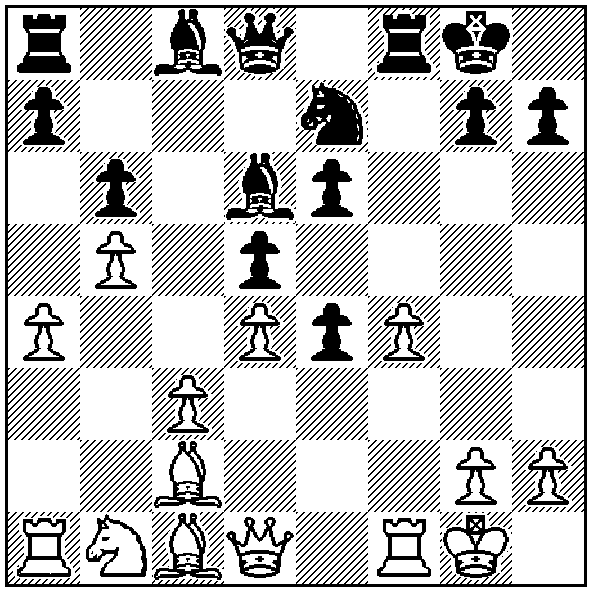
17.
... a6
A good move, whereby he threatens to occupy a6 with his bishop
again.
18. bxa6
Perhaps some manipulating on the queen's side would have enabled White to
keep the Black bishop confined.
18. ... Bxa6 19. Rf2 Rc8
From now to the end Mr. Mills plays with great accuracy. The end game
will repay study.
20. g3 Nf5 21. Ba3 e3 22. Rf3 e2 23. Qd2 Nxd4 24. Re3 e1Q+ 25. Qxe1
Nxc2
Attacking no fewer than four pieces, and Black
resigns.
Source: Glasgow
Weekly Citizen, July 23, 1887 (notes by Georges E. Barbier).
John
D. Chambers - Christopher
Meikle
1. c4
Mr. Chambers played this opening throughout the
tourney.
1. ... b6
The usual and better defense is 1. ... e6.
2. e3 Bb7 3. Nf3 e6 4. Be2 Nf6 5. 0–0 Be7 6. d4 0–0
7. Nc3 d5 8. b3 h6
An inferior move. Pawn to c5 would have been
better.
9. Bb2 Nh7 10. cxd5 exd5 11. Rc1 c6
Pawn to c5 was still good. The move in the text gives
Black a very cramped position.
12. Qc2 Nd7 13. Bd3 Ng5 14. Ne1 Bd6 15. f4 Ne6 16. Nf3
Qe7 17. Ne5 Bxe5 18. fxe5
This allows Black to free his game. 18. dxe5 would be
much stronger.
18. ... f6 19. exf6 Nxf6 20. Qd2 Ng5 21. Rf5 Ng4 22.
Re1 Qd6 23. Rf4 Rxf4 24. exf4
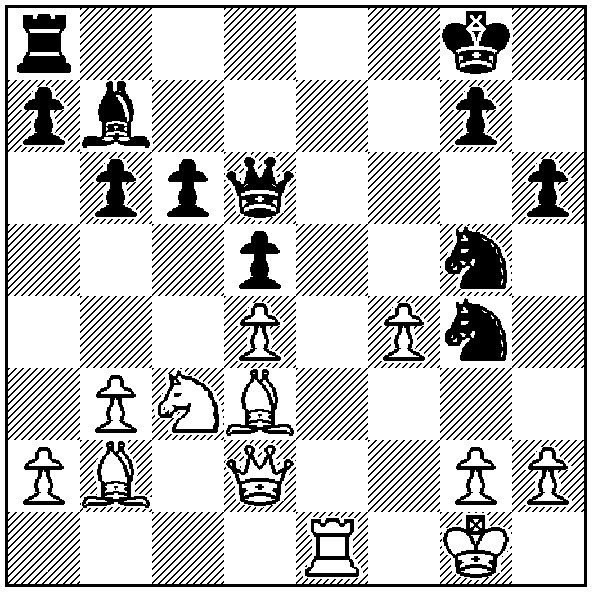
24.
... Rf8
A
miscalculation, which White very soon proves.
25. h3 Nxh3+ 26. gxh3 Nf6 27. Re5
This costs a pawn. We see no objection in 27. Rf1
27. ... Nd7 28. Re2 Rxf4 29. Re8+ Nf8 30. Ba3 c5 31.
dxc5 bxc5 32. Bc1 Rf3 33. Ne2 Rxh3 34. Nf4 Rg3+ 35. Kf2 Rg4 36. Bf5
White now winds up the game with a few powerful
strokes.
36. ... Rg5 37. Be6+ Kh7 38. Qd3+ g6 39. Bh3 Bc6 40.
Qa6 Nd7 41. Qxa7 Re5 42. Bxd7,
and Black resigns.
Sources: The Evening Mail (Dublin), July 28, 1887; Glasgow Weekly Herald, August 27, 1887 (notes by James Marshall?)*.
The Glasgow
Weekly Herald of July 23, 1887, offered the position after White's
33th move, and wrote that Daniel Y. Mills thought that
Black might have drawn after 33. ... d4.
Walter
C. Spens - James
Young
1.
e4 e5 2. Nf3 Nc6 3. d4 exd4 4. Nxd4 Bc5 5. Be3 Nxd4
Not a good defense. The correct defense is 5. ... Qf6 6
c3 Ne7. Even game.
6. Bxd4 Bxd4 7. Qxd4 f6
Qf6 should be played here; the text move blocks the
action of the Black queen.
8. Nc3 Ne7 9. 0–0–0 0–0 10. Bd3 d6 11. f4 Bg4 12.
Rd2 Bh5 13. g4
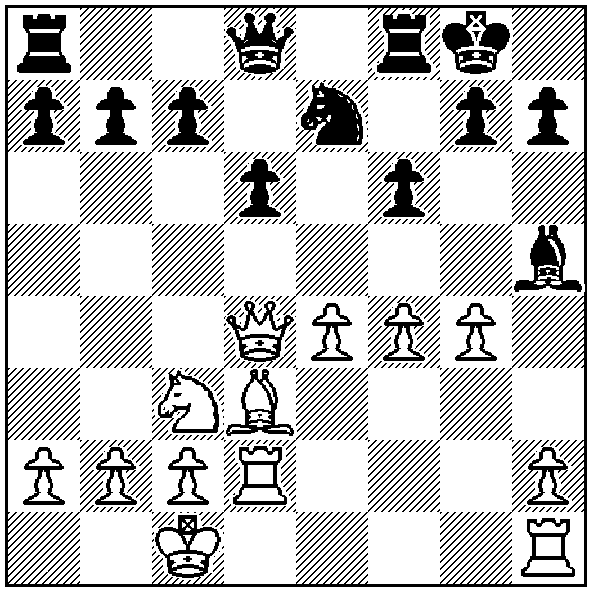
A little examination of position
will show that it would not have been to Black's advantage to accept the
pawn. The rest
of the game is interesting, and full of variation.
13. ... Bf7 14. g5 fxg5 15. Rg2 c5 16. Qg1 Kh8 17. Rxg5
Rg8 18. h4 Ng6 19. Qg4 Qe8 20. Rg1 Qc8 21. Qg3 Qf8 22. h5 Ne7 23. e5 h6
24. Rg4 dxe5 25. fxe5 Bxh5 26. Rf4 Qc8 27. Rh1 Qe8 28. Rfh4 g6 29. Qe3
Rg7 30. Rxh5 Nf5 31. Rxh6+
Resigns.
Source:
Glasgow
Weekly Herald, September 3, 1887 (notes by James Marshall?)*.
The Glasgow
Weekly Herald of July 23, 1887, offered the position after Black's
26th move.
John
D. Chambers - Daniel
Y. Mills
1.
c4 e5
Although this mode of defense is recommended by Mr.
Rosenthal, it is seldom adopted in preference to 1. ... e6.
2. e3 Nf6 3. Nf3
Mr. Rosenthal gives the following continuation here: 3.
Nc3 Bb4 4. Nge2 0–0 5. a3 Bxc3 6. Nxc3 d5. Even game.
3. ... Nc6 4. d4 e4 5. Nfd2 Bb4 6. a3
6. Be2, followed by 7 0–0, would be more to our
taste.
6. ... Bxd2+ 7. Nxd2 0–0 8. d5 Ne5 9. Qc2 d6 10. Nxe4
Bf5 11. Nxf6+ Qxf6 12. e4 Bd7 13. Be2
Played without sufficient consideration. A little
analysis ought to have shown that the text move would block his own
game. 13. f4 would preserve the pawn without any inferiority of position.
13. ... Qg6 14. g3
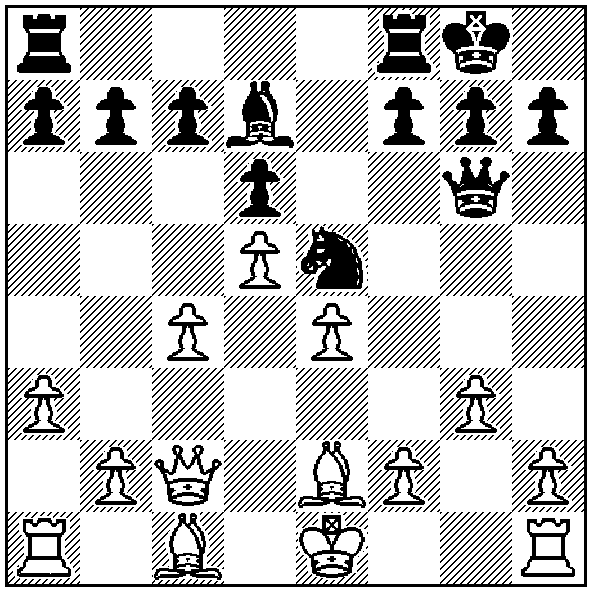
14.
... f5
Black seizes the opportunity to free his game.
15. Bf4 Rae8 16. 0–0–0
The tables are turned, and White is now desperate.
16. ... fxe4 17. h4 h5 18. Qc3 Bg4 19. Bxg4 Qxg4 20.
Bxe5 Rxe5 21. Qe1 Rf3 22. Rd4 Qf5 23. Rf1 e3 24. Rf4 exf2 25. Qd2 Rxf4
26. gxf4 Re4 27. b3 Rxf4 28. Qe2 Qf6
Which thoroughly settles
him.
29. Qe8+ Kh7 30. Qxh5+ Qh6,
and
wins.
Source: Glasgow Weekly Herald, September 10, 1887 (notes by James
Marshall?).
Georges
E. Barbier - James
Marshall
1. e4 e5 2. Nf3 Nc6 3. Bb5 a6 4. Ba4 Nge7 5. d4 exd4 6.
Nxd4 Nxd4 7. Qxd4 b5 8. Bb3 d6 9. c4 Be6 10. 0–0 Nc6 11. Qc3 Ne5 12.
f4 Nxc4 13. f5 Bd7 14. Bxc4 bxc4 15. a4 Bc6 16. Qxc4 Qd7 17. Nc3 Bb7 18.
Nd5 Rc8 19. f6 Bxd5 20. exd5 gxf6 21. Rxf6 Bg7 22. Bg5 h6
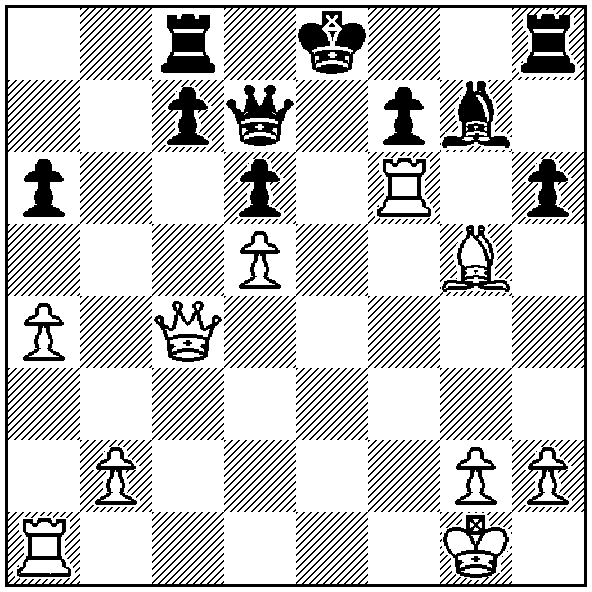
23. Bh4
His 23rd move should have been Re6+, the result of
which, our readers will find after a little investigation, brings about
speedy ruin to Black.
23. ... Kf8 24. Qf4 Re8 25. Rf5 Bxb2 26. Rf1 Rh7 27.
Qg4 Rg7 28. Qh5 Bd4+ 29. Kh1 Be3 30. Bf6 Rg6 31. Bc3 Kg8 32. Rxf7 Qxf7
33. Rxf7 Kxf7 34. Qf5+,
and Mr. Marshall
resigns.
Sources: Glasgow Weekly Citizen, July 16 and 23, 1887 (notes by Georges E.
Barbier)*.
The game was adjourned after White's 28th move and
played out the following day.
John
D. Chambers - David
M. Latta
1. c4 e5 2. e3 Nf6 3. Nf3 Nc6
Another usual continuation in this opening is, we
believe, for both sides to play b3 and b6, Bb2 and Bb7, Be2 and Be7, and
castles.
4. Nc3 Be7 5. Be2 0–0 6. d4 exd4 7. exd4 d5 8. c5 b6
9. cxb6 axb6 10. 0–0 Bd6 11. Bg5 Be7 12. Bb5 Na7 13. Bd3 Be6 14. Qc2
h6 15. Bh4 Nc6 16. a3 Bg4 17. Nb5 Bxf3 18. Qxc6 Bxg2
Giving up the bishop to gain the attack, which does not
turn out well.
19. Kxg2 Nh5 20. Bg3 Bh4 21. Qxc7
Wisely refraining from exchanging bishops; as it is he
considerably weakens Black's forces.
21. ... Qg5 22. Qe5 f5 23. Qxd5+ Kh8 24. Kh1 Bxg3 25.
Rg1 Nf4 26. Qf3 Nxd3 27. Rxg3 Qd2 28. Qxd3 Qxb2 29. Rag1 g5 30. Rh3 Kh7
31. Rxg5 Qxf2
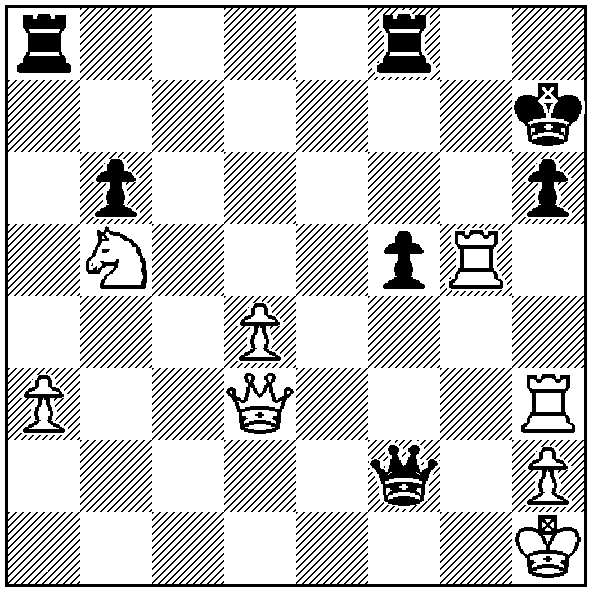
32. Rg1
Things are looking very lively
now.
32. ... Rg8 33. Rhg3 Rae8 34. Qb3 Rxg3
This at once gives up the game; there was little choice
however.
35. Qf7+ Kh8 36. Qxe8+ Kh7 37. Qe7+ Kh8 38. Qe5+
Resigns.
Source: The Evening Mail (Dublin), July 21, 1887 (annotator is unknown).
Christopher
Meikle - James
Young
1. b3 e5 2. Bb2 d6 3. e3 c6 4. d4 e4 5. Nd2 d5 6. c4 a6
7. Ne2 Bg4 8. Qc2 f5 9. Nf4 Nf6 10. h3 Bh5 11. Nxh5 Nxh5 12. Be2 Nf6 13.
0–0 Bd6 14. f3 0–0 15. fxe4 fxe4 16. Rf5
There is much time lost by this move.
16. ... g6 17. Rf2 Bg3 18. Rff1 Nbd7 19. Qd1 h5 20. Nb1
Qc7 21. Na3 Kg7 22. cxd5 Nxd5 23. Qd2
N7f6 24. Bc4 b5 25. Bxd5 Nxd5 26. Nc2 a5 27. Rac1 Ne7 28. d5+ Kh7 29.
dxc6 Nxc6 30. Rxf8 Rxf8 31. Nd4 Qd6 32. Qc2
He cannot take knight with rook on account of the
threatened mate in two moves by Bh2+, and Rf1.
32. ... Nxd4 33. Bxd4 Qe6 34. Qe2 Qd7 35. Rf1
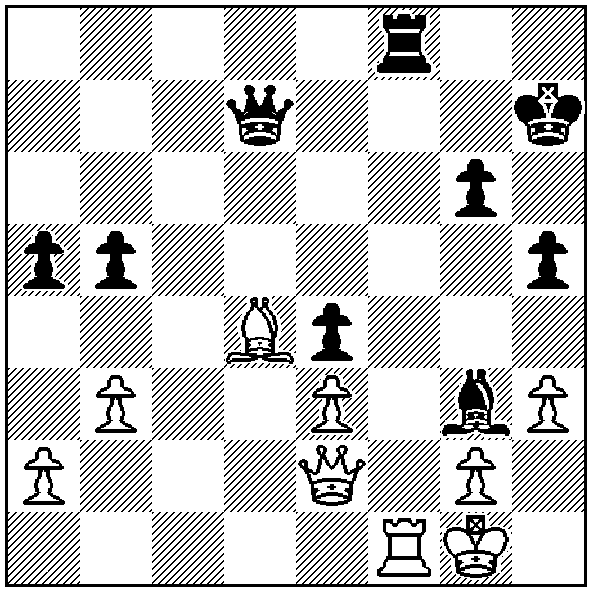
35.
... Rc8
Black could have drawn by exchanging rooks, and playing
Qf5.
36. Ba1 Rg8 37. Qb2 Qd3 38. Qc1 Qd5 39. Qc3 a4 40. bxa4
bxa4 41. Qf6 Qc4 42. Qe7+ Kh6 43. Bf6 Qd5 44. h4 g5 45. Bxg5+ Rxg5 46.
hxg5+
Resigns.
Source: The Evening Mail (Dublin), July 21, 1887 (annotator is unknown).
Daniel
Y. Mills - Georges
E. Barbier
-
Fourth
Congress of the Scottish Chess Association, Major Tournament
-
Edinburgh,
July 16, 1887
-
C01
French Defense, Exchange Variation
1. e4 e6 2. d4 d5 3. Nc3 Nf6 4. exd5 exd5 5. Nf3 Be7 6.
Bd3 0–0 7. 0–0 Nc6 8. h3
This move is often made in this opening, preventing the
pinning of the knight. In this position it seems to be loss of time.
8. ... Nb4
Black thinks he can get the better game by at once
attacking the bishop. In a long game, with fair amount of pieces on
either side, bishops are preferable to knights.
9. Be3 c6
Black, by this move, prepares to fight the battle on
the queen's side, after doubling white's pawns.
10. Be2 Bf5
Black expected the retreat of the bishop, and, after
the text move, considers he has the best of the game.
11. Rc1 Ne4 12. Bd2
A good move. Now, if 12. ... Nxc3 13. bxc3, and if
Nxa2, he is lost.
12. ... a5
Black's plan is to establish good pawns on the queen's
side for the end game. He believes the move to be good, but he did not
follow it up properly.
13. a3 Nxc3 14. bxc3 Na6 15. Ra1
Black has slightly the better game, and the attack at
the 13th move. It has been suggested that Black's play was to sacrifice
two pieces for rook and two pawns, with an apparently winning position
as follows: 13. a3 Nxc3 14. bxc3 Nxc2 15. Rxc2 Bxc2 16. Qxc2 Bxa3.
Followed by b5.
15. ... b5 16. Ne5 Qb6 17. Bd3 Bxd3 18. Nxd3 Bd6 19.
Be3 f5 20. f4 Rfe8 21. Qd2 Qc7 22. Ne5 Rac8 23. Qf2 a4
To isolate the pawn, with the chance of winning it by a
combination of queen and bishop.
24. Nd3 Qe7 25. Ne5 Bxa3 26. Bc1 Bd6
At this stage Black, with common care, should have won.
27. Re1 Qb7 28. Ba3 c5 29. Nd3 b4
Here Black loses his pawn, but still with the attack in
hand.
30. Rxe8+ Rxe8 31. dxc5 bxa3 32. cxd6 a2 33. d7 Qxd7
34. Rxa2 Qb5
34. ... Rb8 might have won.
35. Rb2 Qc4 36. Qd4 a3 37. Rb1 a2 38. Ra1 Qb5 39. Nb4
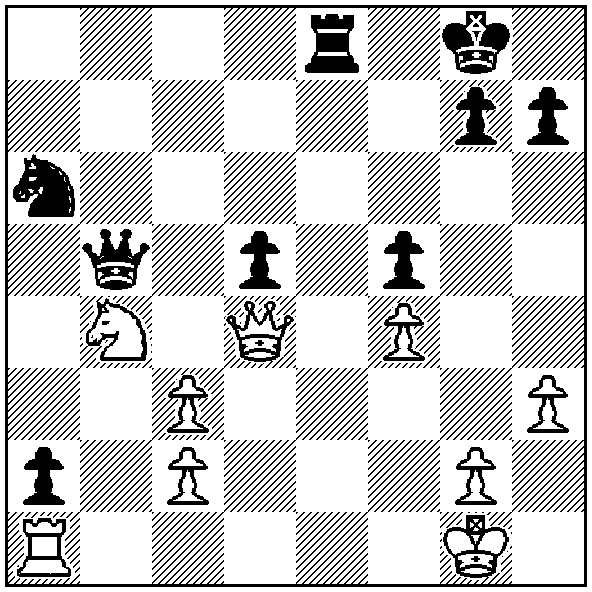
39.
... Re4
A blunder which allows of a draw at
once.
40. Qxd5+ Qxd5 41. Nxd5 Ra4 42. Nb4,
and the game was
drawn.
Source: Glasgow Weekly Citizen, July 30, 1887 (notes by Georges E. Barbier).
John
D. Chambers
- George
B. Fraser
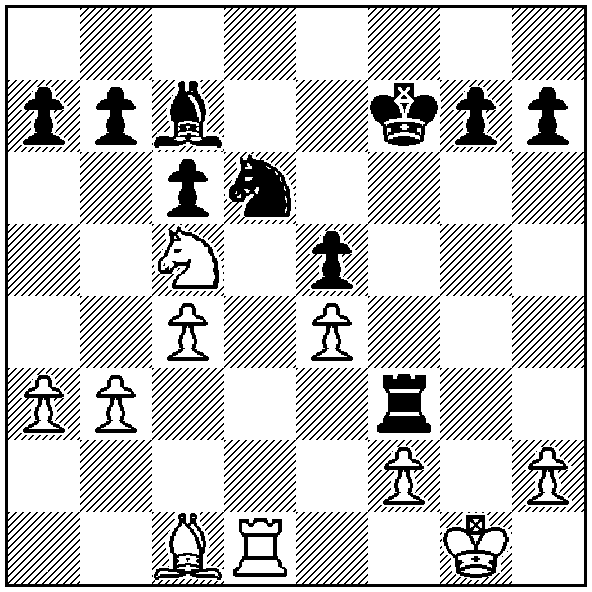
Mr. Mills thought that here knight takes pawn gave Mr. Chambers a
material if not a winning advantage, but this does not seem clear.
Source: Glasgow Weekly Herald, July 23, 1887 (notes by James Marshall?).
George
B. Fraser - Walter
C. Spens
1. e4 d5 2. exd5 Qxd5 3. d4 e5 4. dxe5 Qxd1+
This was not to be expected from Sheriff
Spens.
5. Kxd1 Bc5 6. f4 Ne7 7. Nc3 0–0 8. Na4
White effects a satisfactory exchange by this move.
8. ... Bxg1 9. Rxg1 Rd8+ 10. Ke1 Bf5 11. c3 Bc2 12. b3
Rd1+
More alarming in appearance than
reality.
13. Kf2 Nd7
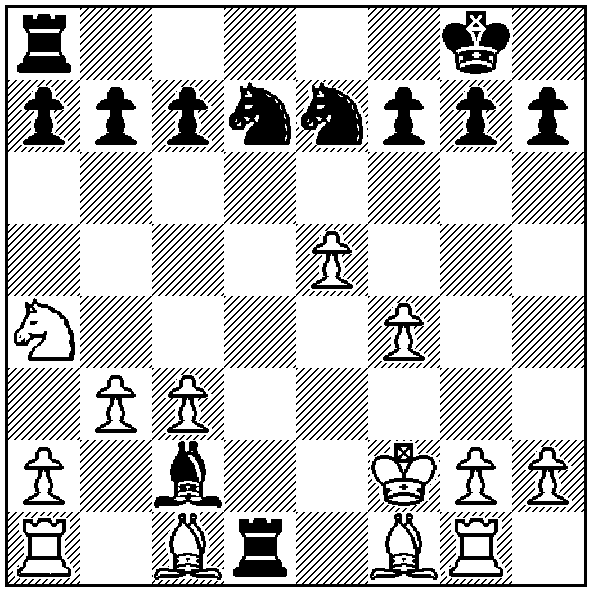
14. Nb2
Black never recovers from this powerful
rejoiner.
14. ... Rd5 15. Bc4 Ra5 16. e6 Nb6 17. exf7+ Kf8 18.
Be3 c5 19. Rgc1 Bg6 20. Rd1 Bxf7 21. Bxf7 Kxf7 22. Rd6
A lost move.
22. ... Nf5 23. Rd2 Nxe3 24. Kxe3 Re8+ 25. Kf3
Ke7 26. c4 Ra6 27. g4 Nd7 28. Rad1
Nb8 29. Re1+ Re6 30. Red1 a6 31. Nd3 b6 32. Ne5 Kf8 33. Rd8 Nc6 34.
Rxe8+ Kxe8 35. Nxc6 Rxc6 36. h4 Ke7 37. f5 Rd6 38. Rxd6 Kxd6 39. Ke4
The extra pawn was evidently all along looked upon to
carry the day.
39. ... b5 40. g5 b4 41. h5 h6 42. f6 gxf6 43. gxh6
Resigns.
Source: The Evening Mail (Dublin), July 28, 1887 (annotator is unknown).
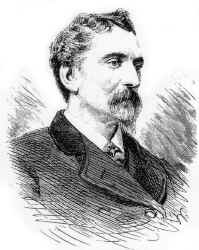 George H. Mackenzie
George H. Mackenzie
The
Fifth Congress of the Scottish Chess Association was a foregone
conclusion. At least, that is what The
Illustrated London News wrote afterwards (August 11, 1888), alluding
to George H. Mackenzie's participation in the 1888 joust in Glasgow.
Captain Mackenzie, a resident of New York but a Scotsman by birth,
stopped at Glasgow on his way to Bradford, where the Fourth Congress of
the British Chess Association was held almost immediately after the
Scottish congress.9 His stay in Glasgow was a matter of veni
vidi vici, judging from the contemporary reports that announced his
attendance.
Whether
Mackenzie's performance was as easy as expected, is doubtful. The Glasgow
Weekly Herald (July 28, 1888):
It
was not till Friday that the places were obtained. Captain Mackenzie –
the winner – whose fame in the chess world naturally made him the
favourite, had to work in earnest to maintain his superiority. Several
of his games were earned only after hours of hard play. Mr. Mills and
Mr. Chambers succeeded in making draws of their games. The former, as
second player, chose the Sicilian defence, which he frequently adopts
with success, although, according to latest theory, it does not give a
satisfactory opening. The latter had the move, and availed himself also
of his favourite opening (English – P to QB fourth) which led to the
longest, and perhaps the hardest-fought, game in the tourney. Started
about ten in the morning, it was still unfinished at closing time.
Just
seven players signed up for the competition, which was less
than in previous years. Barbier knew why the entrance fell short of
expectations: "There were only seven entries for the championship. A
few days before the opening of the meeting it became known that Captain
Mackenzie – a Scotchman by birth, residing in America – intended to
compete, and it is reasonable to suppose that the news may have had some
influence on the number of entries."10
The
competitors, besides Mackenzie, were: Georges E. Barbier, John D.
Chambers, Peter Fyfe (from Glasgow) Edward Hunter (London), Daniel Y.
Mills and Walter C. Spens. Thus, the Scottish contribution to the major
tournament was restricted to Glasgow players.
The
Fifth Congress of the Scottish Chess Association commenced on July 16,
1888, in the rooms of the Glasgow Chess Club, Athenaeum, St. George's
Place, Glasgow, and lasted five days. The Glasgow club had tried to
secure rooms in the Exhibition Buildings in Glasgow, but this attempt
was unsuccessful.11
The
program—with three tournaments; a major, a minor and a handicap—was identical to that of the 1887 congress. The rules and regulations
were almost the same as in 1887. A few changes were enforced. There were
just two prizes in the major tournament: first prize, the cup and £4
4s.; second £2 2s. The winner in the minor tournament received £3 3s.,
and the second prize in this meeting was £2 2s.
A
new rule (in comparison with 1887) was:
After
the entries in the Major Tournament are closed, which will be at 11 a.m.
on Monday the 16th July, there shall be a ballot for pairing the
competitors for each day morning and evening. Competitors will be at
liberty to play off their games at an earlier date than that fixed by
the ballot, if it be convenient, but if not so played off the diet of
play fixed by this ballot shall hold good. If a player does not attend
within 15 minutes of the time fixed, a sand glass will be set running
against him by his opponent.
The
playing committee called attention to two rules in particular: "(1)
That the King must be touched first in castling; and (2) that in the
event of a player touching a square with his piece in his deliberation
on the move, he is debarred from placing his piece ultimately on that
square. The committee have no objections to players waiving enforcement
of these two rules."12
Notwithstanding
that a playing schedule existed, not much is known about the progress of
the tourney. The following has been found out in reference to the daily
play:13
Monday,
July 16, 1888:
Chambers drew with Barbier; Hunter – Mills 1-0; Mills – Spens 1-0.
Tuesday,
July 17, 1888:
Spens – Barbier 0-1; Chambers – Fyfe 0-1; Mills won against Fyfe;
Mackenzie – Hunter 1-0; Mackenzie – Mills ½-½.
Wednesday,
July 18, 1888:
Mills won against Chambers; Barbier – Mackenzie 0-1.
Thursday,
July 19, 1888:
Barbier won against Fyfe; Mills drew with Barbier; Chambers - Mackenzie
adjourned.
Friday,
July 20, 1888:
Mackenzie – Fyfe 1-0.
It
seems that Barbier, Mackenzie and Mills quickly took the lead in the
tournament. At the opening of the fourth day of play it was a pretty
close race for first honors. The respective scores were: Mackenzie 3½,
with two games to play (against Chambers and Fyfe); Mills 3½, with one
game to play (against Barbier); and Barbier 2½, with two games to play
(against Fyfe and Mills). Barbier won against Fyfe, and drew with Mills.
Mackenzie opposed Chambers, but their game was adjourned. The score at
the end of the day was: Barbier 4; Mills 4; Mackenzie 3½, with one game
to play and one to finish.14 Mackenzie defeated Fyfe the
following day, which settled the championship. Mackenzie and Chambers
agreed to a draw without resuming play. 15
Barbier
and Mills divided the second prize. The final score of the major
tournament:16
|
|
|
1
|
2
|
3
|
4
|
5
|
6
|
7
|
|
|
|
1
|
Mackenzie
|
•
|
1
|
½
|
1
|
1
|
1
|
½
|
5
|
|
|
2
|
Barbier
|
0
|
•
|
½
|
1
|
1
|
1
|
½
|
4
|
|
|
3
|
Mills
|
½
|
½
|
•
|
1
|
0
|
1
|
1
|
4
|
|
|
4
|
Fyfe
|
0
|
0
|
0
|
•
|
½
|
1
|
1
|
2
|
½
|
|
5
|
Hunter
|
0
|
0
|
1
|
½
|
•
|
.
|
.
|
1
|
½
|
|
6
|
Spens
|
0
|
0
|
0
|
0
|
.
|
•
|
1
|
1
|
|
|
7
|
Chambers
|
½
|
½
|
0
|
0
|
.
|
0
|
•
|
1
|
|
Hunter
retired after four games.
Nine
players contested in the minor tournament, which was also less than in
the preceding years. Their names were: G. Andrews (from Glasgow), Robert
Brander, Timothy Bost (Glasgow), A.B. Law (Glasgow), James Mackenzie,
William McCombie (Glasgow), James Phillips, H.L. Seligmann (Glasgow),
and William Seligmann (Glasgow).
Andrews
won first prize, Law finished second. Further particulars of this
tournament are missing. The following is the final score:17
|
|
|
1
|
2
|
3
|
4
|
5
|
6
|
7
|
8
|
9
|
|
|
|
1
|
Andrews
|
•
|
1
|
½
|
1
|
1
|
1
|
1
|
1
|
.
|
6
|
½
|
|
2
|
Law
|
0
|
•
|
1
|
1
|
1
|
1
|
1
|
1
|
.
|
6
|
|
|
3
|
McCombie
|
½
|
0
|
•
|
1
|
1
|
1
|
½
|
½
|
.
|
4
|
½
|
|
4
|
W.
Seligmann
|
0
|
0
|
0
|
•
|
1
|
½
|
1
|
1
|
1
|
4
|
½
|
|
5
|
H.
Seligmann
|
0
|
0
|
0
|
0
|
•
|
1
|
1
|
1
|
1
|
4
|
|
|
6
|
Mackenzie
|
0
|
0
|
0
|
½
|
0
|
•
|
1
|
1
|
1
|
3
|
½
|
|
7
|
Phillips
|
0
|
0
|
½
|
0
|
0
|
0
|
•
|
1
|
1
|
2
|
½
|
|
8
|
Bost
|
0
|
0
|
½
|
0
|
0
|
0
|
0
|
•
|
.
|
|
½
|
|
9
|
Brander
|
.
|
.
|
.
|
0
|
0
|
0
|
0
|
.
|
•
|
0
|
|
Brander
retired after five games.
The
twenty contestants
in the handicap tournament were Andrews (class II), William Black (III),
Brander (class VI), Chambers (II), David Chirrey (II), John Court (II),
John Crum (II), E. Duncan (IV), J.M. Finlayson (III), John Gilchrist (II),
John Johnston (V), Law (III), G.H. Mackenzie (I), J. Mackenzie (IV),
Marshall (II), McCombie (IV), Mills (II), Phillips (III), J. Sandeman (IV),
and Spens (III).18
The
first class gave the odds of pawn and move to the second class, pawn and
two moves to the third class, knight to the fourth class, rook to the
fifth class and two minor pieces to the sixth class. The second class
gave the odds of pawn and move to the third class, and so forth.
First
pairing:
Mills won against G.H. Mackenzie; J. Mackenzie won against Andrews;
Finlayson won against Chambers; Sandeman won against Spens; McCombie won
against Gilchrist; Court won against Phillips; Law won against Black;
Crum won against Johnston; Marshall won against Duncan, Chirrey won
against Brander.
Second
pairing:
Mills won against Court; McCombie won against Finlayson; J. Mackenzie
won against Crum; Chirrey won against Law; Marshall won against Sandeman.
Third
pairing:
McCombie won against Mills after having drawn their first game; Chirrey
won against J. Mackenzie without playing because Mackenzie had to leave
town; Marshall won against Sandeman.19
Fourth
pairing:
Marshall won against Chirrey; Marshall won against McCombie; Chirrey and
McCombie agreed to divide the second prize.
Seven
games played in the major tournament have survived, and one contest in
the handicap has been found. The latter was Mills' victory over Captain Mackenzie in the first round.
Andrew
Hunter - Daniel
Y. Mills
1.
e4
e5 2. d4 exd4 3. Qxd4 Nc6 4. Qe3 Nf6
The
more common defenses are Bg4 and g6. Lately, however, the text move has
come in fashion.
5.
Nc3 g6 6. Qg3 Bg7 7. Be2 Nb4
A
fine move, well followed up.
8.
Bd3 0–0 9. Bg5 Qe8 10. 0–0–0 Nh5 11. Qxc7 Be5 12. Qc5 Bxc3 13.
bxc3 Nc6 14. g4 Ng7 15. Bf6 Qe6 16. e5 Qxg4 17. Ne2 b6 18. Qd6 Qe6 19.
Be4 Ba6 20. Nf4
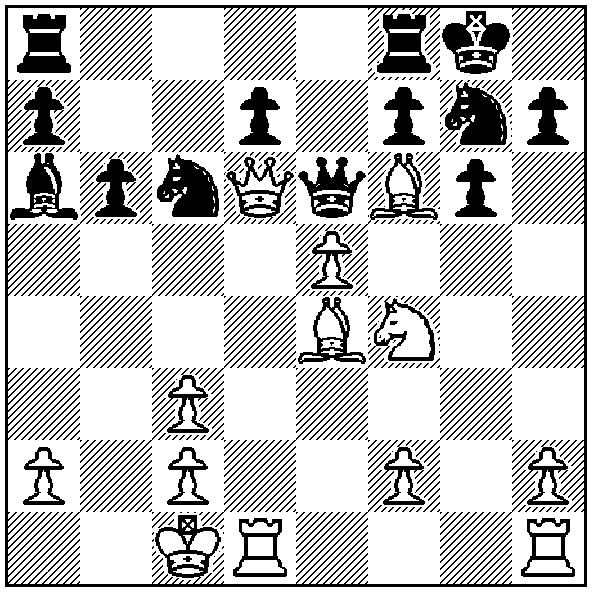
20.
... Qg4
It
was necessary to change queens, as the sequal shows.
21.
Qd2 g5 22. Rdg1,
and
Black resigns.
Source:
Glasgow Weekly Herald,
July 21, 1888 (annotator is unknown).
Daniel
Y. Mills - Walter
C. Spens
1.
e4 d5
We
incline to think that this defense leads to a hampered development on
the part of the second player.
2.
exd5 Qxd5 3. Nc3 Qa5
This
we believe is now thought better than Qe5+.
4.
d4 e5 5. dxe5 Qxe5+ 6. Be2 Bg4 7. Be3 Bxe2 8. Ngxe2 Na6 9. 0–0 Rd8 10.
Qe1
Black
has now got into a dangerous position, from which it is difficult to
emerge without disadvantage
10.
... Bc5 11. Bf4 Qe6 12. Ng3 Qxe1 13. Rfxe1+ Kf8
This
is apparently the best move, but it certainly has the effect of very
much cramping Black's game.
14.
Rad1 Re8 15. Rxe8+ Kxe8 16. Nd5 c6 17. Nc7+ Nxc7 18. Bxc7
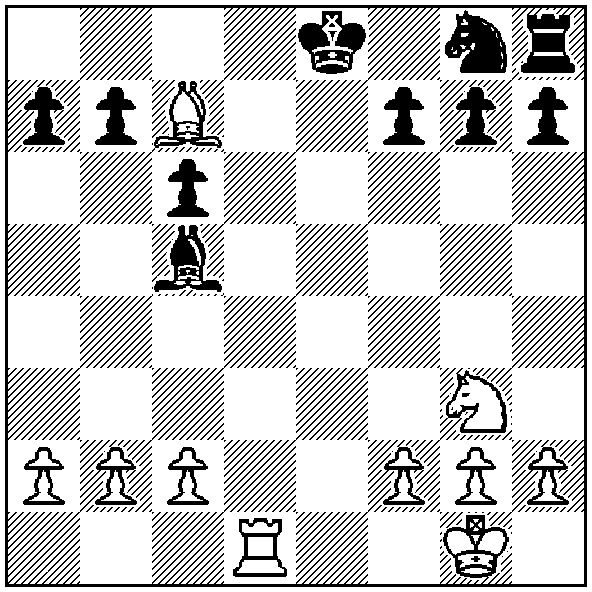
Black's
game is now hopelessly compromised.
18.
... g6 19. Rd8+ Ke7 20. Ne4 Nf6
This
move of course loses the exchange, but has the effect of considerably
disentangling Black's position.
21.
Rxh8 Nxe4 22. Bg3 h5
The
game was prolonged for another 20 moves, White finishing by giving up
the exchange for a winning pawn ending.
Source:
Glasgow Weekly Herald, August
4, 1888 (annotator is unknown)*.
George
H. Mackenzie
- Andrew
Hunter
1.
e4
e5 2. Nf3 Nc6 3. Bb5 Nf6 4. 0–0 Be7
The
usual continuation is knight takes pawn.
5.
Nc3 d6 6. d4 exd4 7. Nxd4 Bd7 8. Nxc6 bxc6 9. Be2
We
would prefer Bd3, and if in reply Black play pawn to d5 advance king's
pawn, etc.
9.
... 0–0 10. Be3 c5 11. f4 Bc6 12. Bf3 Nd7 13. Qd3 Nb6
This
knight is perfectly useless here; far better would have been Re8,
followed by Nf8.
14.
b3 Qd7
Again
a weak and useless move; Bf6 seems more to the point.
15.
Rad1 Rad8 16. g4
Preventing
the advance of king's bishop's pawn, and further cramping Black's game.
16.
... Qe6 17. Nd5 Bxd5 18. exd5 Qd7 19. Rd2 f5
Since
White's answer is so obvious, we cannot see why this move was made.
20.
Rg2 Rf7 21. Kh1 Rdf8 22. Rfg1 Bd8 23. gxf5 Bf6 24. Bf2 Qd8 25. Rg4 Nd7
26. c4 a5 27. Bd1 Re8 28. R4g2 Rfe7 29. Bh5 Rf8 30. Be3
We
confess that the object in moving this bishop to and fro is a mystery to
us.
30.
... Kh8 31. Rg3 Qb8 32. Rh3 Kg8 33. Bf2 Qd8 34. Bg6
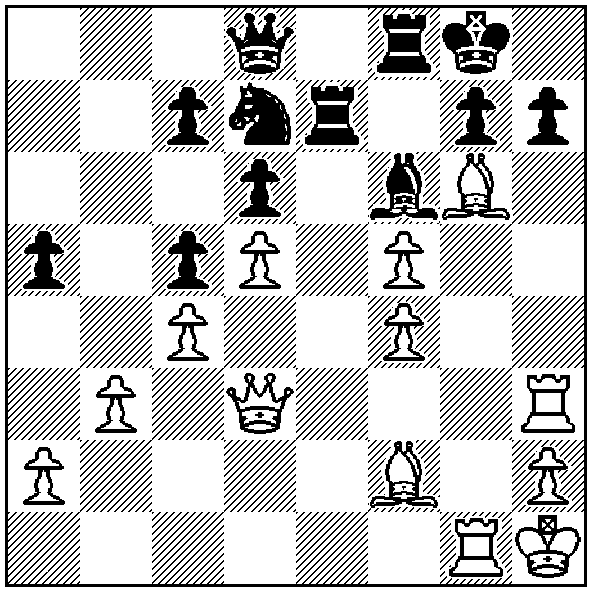
34.
... h6
If
Black takes bishop, White would in reply take with pawn, threatening
Rh8+ and Qh3+, and Black cannot avoid the mate.
35.
Re3 Rxe3 36. Bxe3 Kh8 37. Bd2 Bd4 38. Re1 Qh4 39. Qg3 Qd8 40. Bxa5 Qa8
41. Bxc7 Qxa2 42. Bxd6 Bf2 43. Qg2 Ra8 44. Rf1
Resigns.
Sources:
Glasgow Weekly Herald, July
28, 1888; Turf, Field and Farm,
August 17, 1888 (notes by Eugene Delmar).
George
H. Mackenzie
- Daniel
Y. Mills
-
Fifth
Congress of the Scottish Chess Association, Major Tournament
-
Glasgow,
July 17, 1888
-
B45 Sicilian
Defense, Taimanov Variation
1.
e4
c5 2. Nc3 Nc6 3. Nf3 e6 4. d4 cxd4 5. Nxd4 Nf6 6. Nxc6 bxc6 7. e5 Nd5 8.
Ne4 f5 9. exf6
Or
9. Nd6+ Bxd6 10. exd6 Qf6 11. f4, etc. The variation adopted by White is
less complicated and preferable to the defense.
9.
... Nxf6 10. Nd6+ Bxd6 11. Qxd6 Qe7 12. Bf4 Qxd6
On
the whole the exchange of queens is perhaps preferable to 12. ... Ne4,
thus leaving the exchange optional to White.
13.
Bxd6 Ne4 14. Ba3 d5 15. f3 Nf6 16. Bd3 Kf7 17. 0–0 Re8 18. Rae1 g6 19.
f4
From
the moment the queens were exchanged, the game already assumed the
aspect of a draw. White is now opening an outlet for his rooks; the only
possible chance for an attack.
19.
... a5 20. Rf3 Ba6 21. Bxa6 Rxa6 22. Rb3
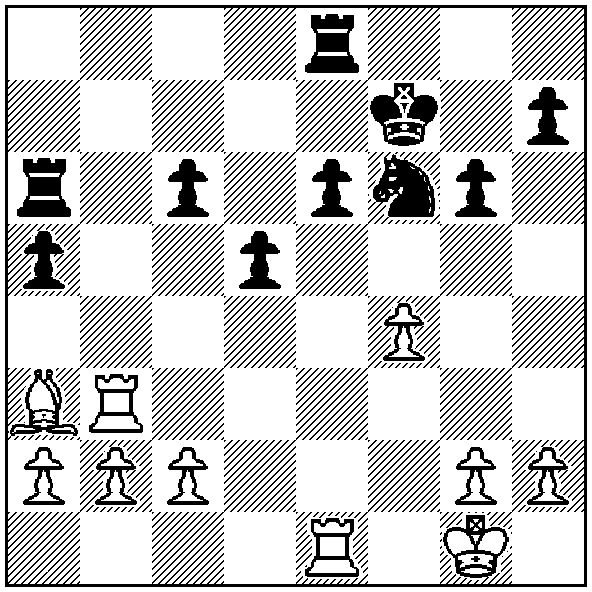
22.
... Rd8
The
right move. If 22. ... Ra7, then 23. Bc5 Rd7 24. Rb6, and 25. Ra6,
attacking the isolated rook's pawn.
23.
Rb7+ Rd7 24. Rb8 Ne4 25. Re3 c5 26. g4 Raa7 27. Reb3 Rdc7 28. Rh8 Kf6
29. Kg2 g5 30. fxg5+ Kxg5 31. Rg8+ Rg7
Black
had no need to exchange; but he evidently is quite satisfied with a
draw; although he has a slight advantage with a strong center, knight
against bishop and the latter piece out of play.
32.
Rxg7+ Rxg7 33. h3 Rf7 34. Rf3
Compulsory.
If 34. Rb5, then 34. ... Rf2+ 35. Kg1 Rxc2 36. Rxa5 Kf4, and wins.
34.
... Rxf3 35. Kxf3,
and
the game was abandoned as drawn. Black has still the better ending; but
perhaps barely enough to win against such a skillful opponent as the
Captain. The result, however, is a moral victory for Mr. Mills.
Sources:
Glasgow Weekly Herald, July
21, 1888; Glasgow Weekly Citizen,
July 21, 1888; Manchester Evening
News, July 21, 1888; Bradford
Observer Budget, July 28, 1888; The
Field, August 4, 1888 (notes by Leopold Hoffer)*; The Illustrated Sporting and Dramatic News, August 11, 1888; Columbia
Chess Chronicle, August 18, 1888; Turf,
Field and Farm, September 7, 1888.
The
Columbia Chess Chronicle wrote
erroneously that the game was played on July 21, 1888.
Walter
C. Spens
- Georges
E. Barbier
-
Fifth
Congress of the Scottish Chess Association, Major Tournament
-
Glasgow,
July 17, 1888
-
C01
French Defense, Exchange Variation
1.
e4
e6 2. d4 d5 3. Nc3 Nf6 4.exd5
Bg5
is considered stronger, affording a more lasting attack. The text move
equalizes the game at once by freeing the action of Black's White
bishop.
4.
... exd5 5. Bd3 Be7
The
usual move is 5. ... Bd6, but the text move is good too; it prevents at
some future time the awkward pinning of king's knight with bishop.
6.
Nge2 0–0 7. 0–0 a6
Black
meant this to be a waiting move, expecting White to play 8. f4, in which
case he would also have played the text move, without the disadvantage
of getting his knight pinned, as in the event of pawn takes pawn, the
bishop checked, keeping the move in hand.
8.
Ng3 c5
Premature
and not consonant with the development of Be7 at fifth move. Besides,
this move isolates the queen's pawn.
9.
dxc5 Bxc5 10. Bg5 Be6 11. Nh5 Nbd7 12. Qf3 Be7
And
now the bishop must come back, as White threatens to double Black's pawn
and weaken his king's side.
13.
Nxf6+ Nxf6 14. Rad1
A
slip, evidently.
14.
... Bg4 15. Qg3 Bxd1 16. Rxd1 h6
A
bad move, played without sufficient deliberation.
17.
Bxh6 Ne8
Black's
game is now very bad, and it is difficult to find a satisfactory defense.
18.
Nxd5 Bd6 19. Bf4 Bxf4 20. Qxf4 Qd6
Black
offers to exchange queens, relying on the two rooks to make up for the
loss of two pawns.
21.
Qe4 g6 22. Bc4 Rd8
Kg7
would have been better.
23.
Ne7+ Qxe7 24. Qxe7 Rxd1+ 25. Bf1 Ng7 26. Qxb7 Re8 27. Qxa6 Ree1 28. g4
Ne6 29. Kg2 Rxf1 30. Qxf1 Nf4+
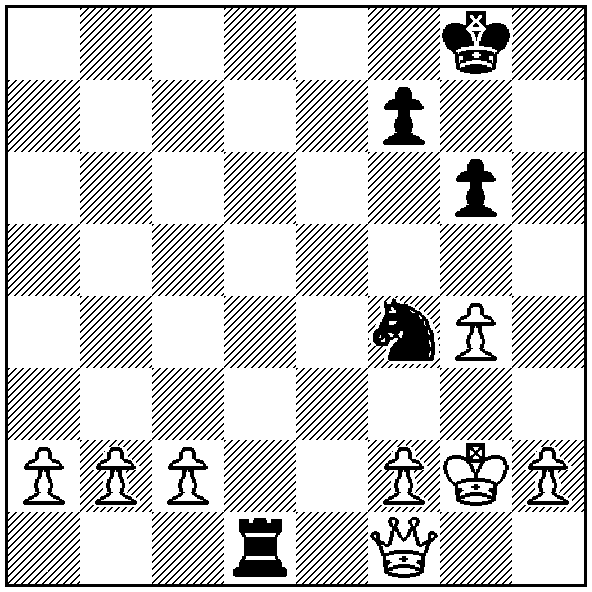
31. Kf3
A
remarkable oversight. Black would have been satisfied with a perpetual
check, as he could scarcely expect to win with a knight against the past
pawns.
31.
... Rxf1
Source:
Glasgow Weekly Citizen,
August 11, 1888 (notes by Georges E. Barbier).
John
D. Chambers
- Peter
Fyfe
1.
c4 f5
A
form of defense favored by Bird, but mostly condemned by other masters.
2.
e3 Nf6 3. Nf3 d6 4. d4 g6 5. Be2 Bg7 6. Nc3 0–0 7. 0–0 Nbd7 8. b3 e5
9. Ng5 Re8 10. d5 Nc5 11. b4 Nce4 12. Ngxe4 fxe4 13. c5 Bf5 14. Ba3 dxc5
15. bxc5 a6 16. h3 h5 17. Rb1 Rb8 18. Bc4 Kh7 19. Rb3 Bf8 20. Qe2 Qc8
21. Kh2
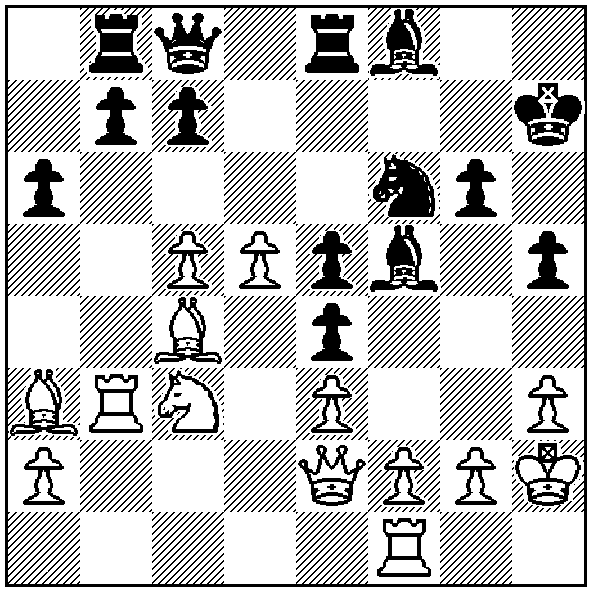
21.
... g5 22. f3 Kg6 23. fxe4 Nxe4 24. Nxe4 Bxe4 25. d6 Bf5 26. Bf7+
Kxf7 27. e4 Kg6 28. Rxf5 cxd6 29. Qd2 Bh6 30. Rbf3 Re6 31. Qd5 g4 32.
hxg4 hxg4 33. Rf1 Bf4+ 34. R1xf4 exf4 35. Rg5+ Kf7 36. Qf5+ Rf6 37. Qh7+
Ke6 38. Rg7 g3+ 39. Kg1 Qd8 40. Qh3+ Ke5 41. Bb2+ Kxe4 42. Qh7+ Kd5 43.
Qd3+ Kc6 44. Qc4 dxc5 45. Bxf6 Qxf6 46. Qe4+ Kb5 47. Qd3+ Ka5 48. Qa3+
Kb6 49. Qb3+ Ka7 50. Rd7 Qa1+ 51. Rd1 Qe5 52. Kf1 Rh8 53. Kg1 Re8 54.
Qf3 Qe1+,
and
White resigned. The game is full of vicissitudes.
Source:
Glasgow Weekly Herald,
November 10, 1888 (annotator is unknown).
Georges
E. Barbier
- George
H. Mackenzie
1.
e4
e5 2. Nf3 Nc6 3. Bb5 Nf6 4. 0–0 Nxe4 5. Re1
This
method of treating the attack in this opening was adopted by Steinitz
against Zukertort, so Mr. B. thought he could not be far wrong to follow
as far as possible the example of much a successful master.
5.
... Nd6 6. Nxe5 Nxe5
Zukertort
began by adopting this move, but in the latter games he moved 6. ...
Be7.
7.
Rxe5+ Be7 8. Bd3
Appearances
are against this move, which for a time blocks the action of the queen's
bishop; still it is a very strong move. An examination of the position
will show that Black's game is cramped, and that White keeps grip on for
a considerable time, getting later on the better development.
8.
... 0–0 9. Nc3 f5 10. Qf3 Bf6 11. Re3 g6 12. b3 Nf7 13. Bc4 c6
Inducing
White to play 14. Ba3, in which case Black would have played d5.
14.
Bxf7+ Rxf7 15. Ba3 d5 16. Rae1
Here
White's game would be taken for choice.
16.
... Bd7 17. R3e2 Kg7 18. Nb1
Desiring
to develop his center and guard against the incursion of Black's queen
at a4.
18.
... b6
With
the intention of shutting out the bishop, who has a commanding position.
19.
Bd6 Rc8
Posting
his rook in a good position for future contingencies.
20.
Be5 Bxe5 21. Rxe5 Qf6 22. d4 Rc7 23. Nc3 Bc8 24. Ne2
Not
good, as it develops Black's game.
24.
... f4 25. c4
Giving
up a pawn for a center attack.
25.
... dxc4 26. Nc3 cxb3 27. Ne4 Qd8 28. axb3 h6 29. Qc3
A
strong position for queen.
29.
... Bf5 30. f3
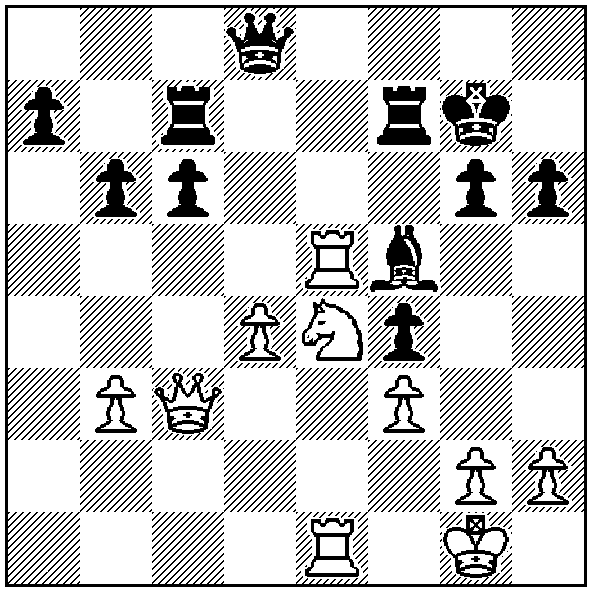
30.
... Kh7
Evidently
a slip, as by his next move White obtains a strong attack, which in
better hands should have been successful.
31.
Re8 Qd5
Of
course, if he had taken rook he would have lost her majesty and the game
at once.
32.
Re5 Qd7 33. Re8 Bxe4 34. R1xe4 Qd5 35. R4e5 Qd6 36. R5e6 Qd5 37. Re5 Qd7
38. d5
We
are not prepared to say that this move loses the game, but White might
have kept his strong center position and drawn.
38.
... cxd5 39. Qd4 Rc8 40. Rxc8
He
might have won the queen for two rooks, by R5e7, but lost in the ending.
40.
... Qxc8 41. Qxd5
Pawn
to h3 would have been best, as the pawn is bound to fall. With this move
we believe the game drawn now.
41.
... Rd7,
and
the game was continued for some 20 moves, and won by Black. White here
moved queen to b5, but Black managed to exchange both pieces, winning by
his extra strength on queen's side.
Sources:
Glasgow Weekly Citizen, July
21, 1888 (notes by Georges E. Barbier); Leeds
Mercury, July 28, 1888; Columbia
Chess Chronicle, September 22, 1888.
Daniel
Y. Mills
- George
H. Mackenzie
1.
e4 Nc6 2. d4 e5 3. d5 Nce7 4. Nf3 Ng6 5. h4 d6 6. h5 N6e7 7. Bg5 Nf6 8.
Nc3 Bg4 9. h6 Ng6 10. hxg7 Bxg7 11. Qd3 a6 12. Nh4 Qe7 13. f3 Bd7 14. g4
Nxh4 15. Bxh4 Qf7 16. Ne2 h6 17. Ng3 0–0–0 18. 0–0–0 c5 19. dxc6
Bxc6 20. Qc3 Kb8 21. Bc4 d5 22. Bb3 Qc7 23. Bxf6 Bxf6 24. exd5 Bg5+ 25.
Kb1 Bb5 26. Qxc7+ Kxc7 27. c4 Be8 28. Bc2 Bf7 29. Ne4 Be7 30. Rh2 b5 31.
cxb5 axb5 32. Bb3 Bg6 33. Rc2+ Kb7 34. Rc6 Bxe4+ 35. fxe4
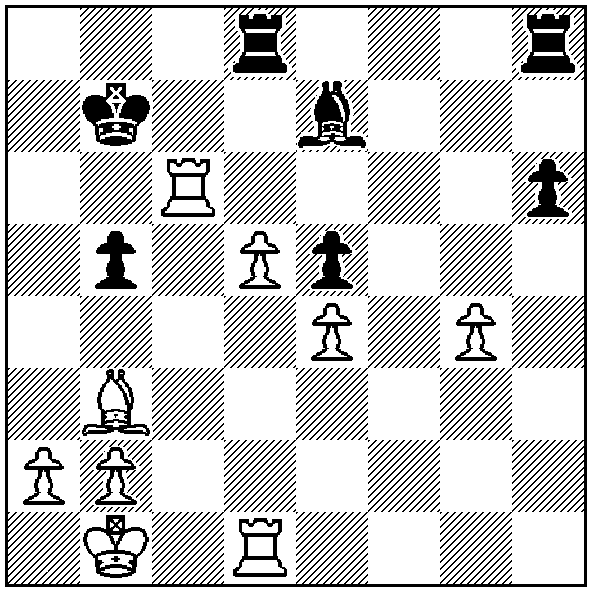
35.
... Bg5 36. a4
bxa4 37. Bxa4 Rhf8 38. Rd3 Rf1+ 39. Ka2 Ka7 40. Rg6 Rf4 41. Rg7+
Black
resigns.
Source:
Manchester Evening News,
August 4, 1888.
Captain
Mackenzie engaged fifteen members of the Scottish Chess Association in
simultaneous play on July 20, 1888. The exhibition started at 7.00 p.m.
and finished shortly after 10.00 p.m.
He won ten games, drew three, and lost two. The full list: Mackenzie -
M'Arthur ½-½; Mackenzie - Forsyth 1-0; Mackenzie - Robertson (from
Edinburgh) 1-0; Mackenzie - Pagan 1-0; Mackenzie - Brander 1-0;
Mackenzie - Gilchrist 1-0; Mackenzie - Russell 0-1; Mackenzie - McCombie
1-0; Mackenzie - Marshall ½-½; Mackenzie - Seligmann 1-0; Mackenzie -
Finlayson 1-0; Mackenzie - Black ½-½; Mackenzie - Robertson (from
Glasgow) 1-0; Mackenzie - Court 0-1; Mackenzie - Bost 1-0.20
The
following afternoon Mackenzie gave a second performance of
simultaneous play at the Glasgow Chess
Club. This time nine opponents put their luck to the test.
The Captain won six games, drew one and lost two. The individual results on this occassion
were: Mackenzie - Veitch 1-0; Mackenzie - Sandeman 1-0; Mackenzie -
Buchanan 1-0; Mackenzie - Pirrie
½-½; Mackenzie - Finlayson
1-0; Mackenzie - Chirrey 0-1; Mackenzie - Law 1-0; Mackenzie - Marshall
0-1; Mackenzie - Kinghorn 1-0.21
Below
are three games and one position of these exhibitions.
George
H. Mackenzie
- David
Forsyth
1.
e4 e5 2. d4 exd4 3. Qxd4 Nc6 4. Qe3 Bb4+
This
is one of the best defenses. Another good defense is 4. ... g6.
5.
c3 Ba5 6. Qg3 Qf6 7. Nf3 g6 8. Bg5 Qg7 9. Bc4 d6 10. 0–0 Nge7
This
error loses Black two moves. The Captain's correct reply shows that
Black had nothing better than to retire the knight home again.
11.
Qh4 Ng8 12. Nbd2 Be6 13. b4
White
very early commences a bold attack, the soundness of which is doubtful;
for, as the game went, Black might have at least secured a draw.
13.
... Bb6 14. a4 Qxc3
Black
is prepared to give a piece for several pawns.
15.
Bxe6 fxe6 16. a5 Bd4 17. Rac1 Qxb4 18. a6
This
is much superior to Rc4, in reply to which Back would have played Bxf2+,
getting four pawns for his bishop.
18.
... Kd7 19. axb7 Qxb7 20. Rxc6 Bxf2+ 21. Rxf2 Qxc6
Black
is now the superior in force, though White's position is very attacking.
22.
Nd4 Qb6
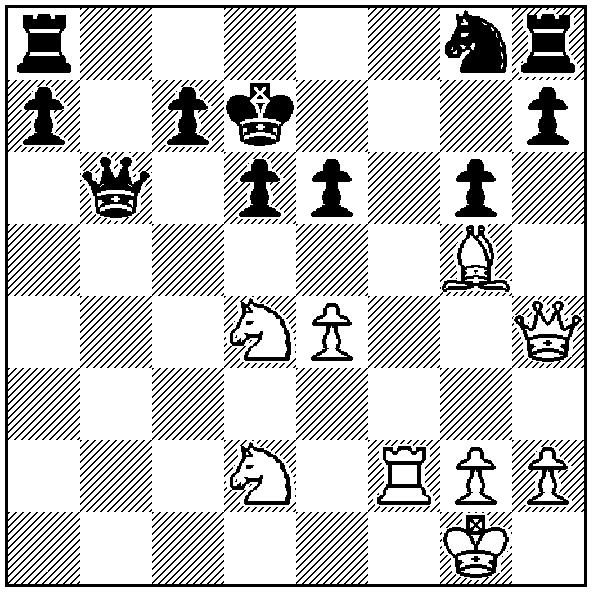
23.
Nxe6
A
very pretty move. Black's taking the knight would be fatal.
23.
... Re8 24. Nc4 Qb1+ 25. Rf1 Qb3 26. Rf7+ Kxe6 27. Rxc7 Qd1+ 28. Kf2 Qh5
Here
Black loses the game. Rf8 would have forced a draw, as a subsequent
examination of the position with the Captain showed.
29.
Qf4
Resigns.
Sources:
Glasgow Weekly Herald,
September 29, 1888 (annotator is unknown)*; The
Chess Player's Chronicle, November 28, 1888; Columbia
Chess Chronicle, January 3, 1889.
George
H. Mackenzie
- J.
Court
1.
e4 e5 2. Nc3 Nc6 3. f4 exf4 4. Nf3 g5 5. d4 g4 6. Bxf4 gxf3 7. d5 f2+ 8.
Kxf2 Qf6 9. g3 Ne5 10. Kg2 d6 11. Nb5 Kd8 12. Be2 Qg6 13. Bf3 Nxf3 14.
Qxf3 a6 15. Nd4 Bg4
Mr. Court has now got as
good a position as his formidable antagonist, with the advantage of the
piece sacrificed by White for attack.
16.
Qd3 Nf6 17. Rhe1 Nh5
Mr.
Court defends strongly by counter-attack.
18.
Bd2 Rg8 19. c4 Bd7 20. b4 Bh6
Mr.
Courts play is vigorous as well as careful and accurate.
21.
Re2 Bxd2
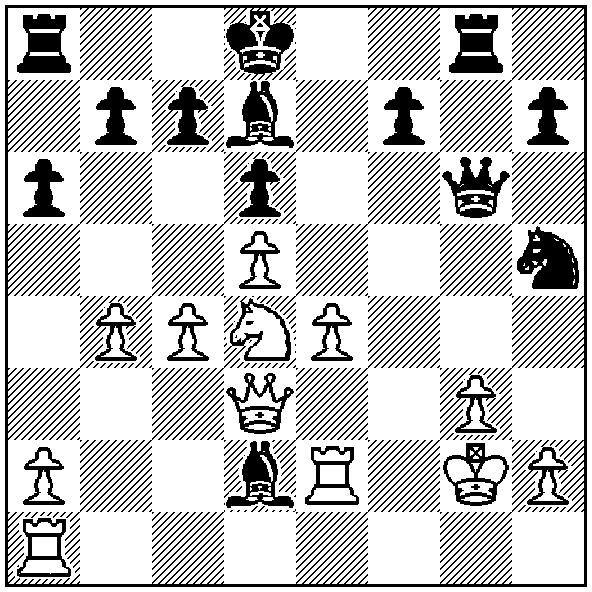
22. Qxd2
The
bishop can, of course, only be recaptured by the queen; otherwise Nf4+;
but the effect is to permit the decisive attack of Black.
22.
... Nxg3 23. hxg3 Qxg3+ 24. Kh1 Qh4+ 25. Rh2 Qxe4+ 26. Rg2 Bh3 27. Rag1
Rxg2 28. Rxg2 Kd7 29. Qg5 Bxg2+ 30. Qxg2 Qxd4 31. Qh3+ Ke7,
and
White resigns.
Source:
Glasgow Weekly Herald, August
4, 1888 (annotator is unknown).
George
H. Mackenzie
- Robert
Pirrie
-
Glasgow
Chess Club, Simultaneous Exhibition
-
Glasgow,
July 21, 1888
-
C02 French
Defense, Advance Variation
1.
e4 e6 2. d4 d5 3. e5
Not,
we think, so good as the usual continuation of exd5 or Nc3.
3.
... c5 4. c3 Nc6 5. Nf3 Bd7 6. Bd3 f6
A
doubtful move; it seems to us rather to expose the Black king.
7.
0–0 Qb6 8. dxc5 Bxc5 9. b4 Be7 10. Re1 0–0–0
Black,
however, castles on the queen's side, and perhaps this was in
contemplation when the sixth move was made. Frequently castling on the
queen's side early in the game is of doubtful propriety, as this side is
more open to attack than that of the king.
11.
a4
And
White at once pushes on to the attack.
11.
... fxe5 12. b5 e4
The
situation becomes lively and interesting.
13.
bxc6 Bxc6 14. Nd4 exd3 15. Rxe6 Bc5 16. Qxd3 Nf6 17. Bf4 Qb2 18. Ra2
A
fine, but apparently unsound combination, which, doubtless, Captain
Mackenzie would not have gone in for in any match game, but in playing a
number of simultaneous games with presumably weaker antagonists a strong
player takes the risk of eventualities whenever he sees an opening for a
powerful attack. We give a diagram of the position at this point.
18.
... Qxa2 19. Rxc6+ bxc6 20. Qa6+ Kd7 21. Qxc6+ Ke7 22. Qxc5+ Kf7 23. Nd2
Rhe8 24. h3 Qxa4 25. N2f3 Ne4 26. Qc7+ Qd7 27. Ne5+ Rxe5 28. Qxe5 Nxc3
29. Nf5 Ne2+ 30. Kh1 Nxf4 31. Qxf4 Kg8 32. g4 d4 33. h4 d3 34. Qd2 a5
35. h5 a4 36. h6 g6 37. Ne3 a3 38. Qa2+ Qf7 39. Qxa3
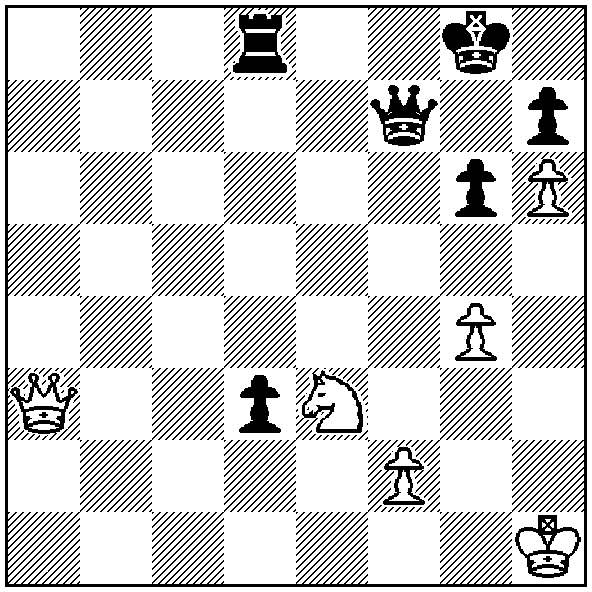
39.
... Qxf2
Black
has played very well, but here he gives his powerful adversary a chance
of which he at once avails himself. At this point it would have seem as
if d2 would have won. Captain Mackenzie's object, of course, was to
secure a draw by perpetual check.
40.
Qe7 Qf8 41. Qe6+ Qf7 42. Qb6 Rd7 43. Qb8+ Qf8 44. Qb3+ Qf7,
and
the game was abandoned as drawn.
Sources:
Glasgow Weekly Herald,
September 22, 1888 (annotator is unknown); The
Chess Player's Chronicle, November 7, 1888.
George
H. Mackenzie
- J.
Sandeman
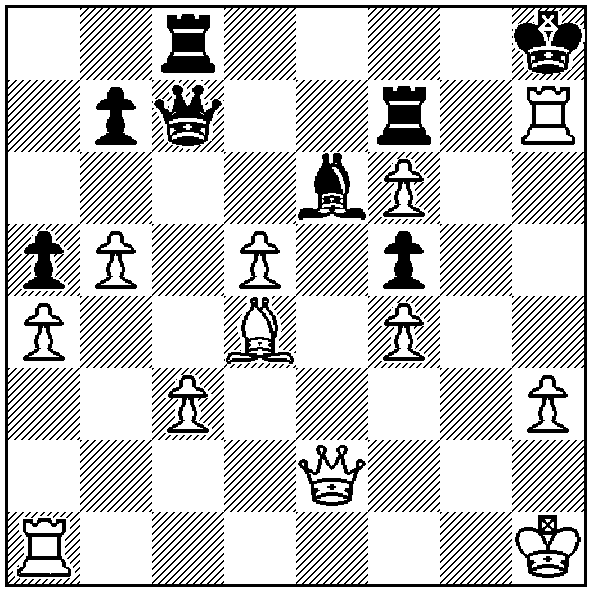
White
had just played Rxh7+, which forced the game.
Source:
Glasgow Weekly Herald, July 28, 1888
Mackenzie visited Edinburgh before he left Scotland for Bradford.
Back
to the main picture of this article. The photo was taken by Marshall Wane, Edinburgh.
----------
*
The diagram was given in the original source.
----------
Notes:
1 The
Glasgow Weekly Herald of July 2, 1887, published the
program and rules of the Fourth Congress of the Scottish Chess
Association. 2 Glasgow
Weekly Citizen, July 2, 1887. 3 The Morning Post,
August 1, 1887. 4 The list is based on
(daily) reports in the Edinburgh Evening News, the Glasgow
Herald, the Glasgow Weekly Citizen, and the Glasgow Weekly
Herald. 5 Glasgow
Weekly Citizen, July 23, 1887. 6 Glasgow Weekly Herald,
July 23, 1887; Nottinghamshire
Guardian, July 30, 1887; The Chess Monthly, August
1887, page 361; The British Chess Magazine, August-September
1887, page 344; The International Chess Magazine, September 1887,
page 262. 7 Glasgow Weekly
Herald, July 23, 1887; The British Chess Magazine,
August-September 1887, page 344.
8 Glasgow Weekly Herald,
July 23, 1887; The British Chess Magazine, August-September 1887,
pages 344-345. The reports in the Glasgow Weekly Herald and The
British Chess Magazine are conflicting. According to The British
Chess Magazine, Young against M'Arthur was the only game which was
decided after the first confrontation had been drawn, and Robertson
against Mackenzie was the onlycontest which was decided after the first
two games had been drawn. 9 The Bradford international tournament took place from
August 6 till August 18, 1888.
10 Glasgow
Weekly Citizen, July 21, 1888.
11 Glasgow
Weekly Herald, June 2, 1888.
12 The Glasgow Weekly Herald of July 14, 1888, published the program and
rules of the Fifth Congress of the Scottish Chess Association.
13 The list is based on (daily) reports in the Edinburgh Evening News, the Glasgow
Herald, the Glasgow Weekly
Citizen and the Glasgow Weekly
Herald. 14
Glasgow Herald, July 20, 1888.
15 Glasgow
Herald, July 20, 1888. 16
Glasgow Weekly Herald, July
28, 1888; Manchester Evening News,
July 28, 1888; The Illustrated
Sporting and Dramatic News, August 4, 1888; The
British Chess Magazine, August-September 1888, page 356; The
Chess Monthly, September 1888, page 11; The
International Chess Magazine, September 1888, page 266.
17 Glasgow
Weekly Herald, July 28, 1888; The
British Chess Magazine, August-September 1888, page 357; The
Chess Monthly, September 1888, page 12.
18 Glasgow Weekly Herald,
July 28, 1888; The British Chess
Magazine, August-September 1888, page 358; The
Chess Monthly, September 1888, page 12.
19 All sources (Glasgow
Weekly Herald, The British
Chess Magazine, and The Chess
Monthly) claimed that Marshall won against Sandeman in the second
and third round.
20 Glasgow Herald, July 21, 1888. 21 Glasgow
Weekly Herald, July 28, 1888. The Glasgow Weekly Citizen (July
28, 1888) claimed that Mackenzie played against ten opponents. The
British Chess Magazine (August-September 1888, page 359) and The
Chess Monthly (September 1888, page 13) offered eight antagonists,
and claimed that the exhibition took place on July 22, 1888.
----------
Pictures:
Edinburgh 1887 (The Illustrated
London News, August 6, 1887); Daniel Y. Mills (The Chess Monthly,
October 1890); George H. Mackenzie (Illustrirte Zeitung, October
6, 1883)
©
August 2015 Joost van Winsen. All Rights Reserved
|
